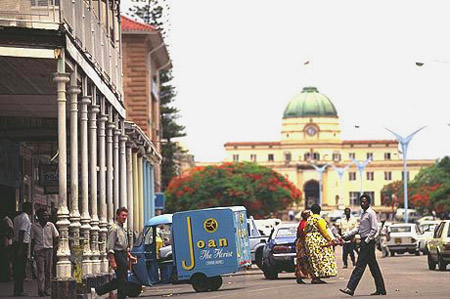Jan 07, 2026
Jan 07, 2026
It’s Friday again and the afternoon is resounding with the distant marimba beat inoculating that certain joyousness which heralds the coming of a weekend. My one-year old son, now so tuned to the marimba, crawls out towards the sounds, his face lit up with the same spirit which is common to the people here. He has an Ndebele name lovingly given to him by the nursing staff. He is Tabani. That was Bulawayo fifteen years ago. My friends also called it Little London. My trek in the health sector of African countries had reached Bulawayo — the heart of Matebeleland. A small boy helped me off the train, carried my luggage and even telephoned the medical superintendent about my arrival. Rose, the superintendent's beautiful secretary welcomed me with open hands. Never had I been welcomed so lavishly and as warmly as I was in Zimbabwe. I had come to work in a hospital in the Mizlikazi Township, a hospital which boasted of not only cleanliness and efficiency but also a beautiful pub within its campus run by the hospital staff on a non-profit basis. There has never been any case that a hospital staff has ever been found guilty of intoxication. Soon, I was absorbed and accepted within the sounds, culture and people of Zimbabwe, as if I was one of them. We shared the same visions and understood the needs of the people of whom we had been taught to take care. I became a proud part of them. The economy was not doing well, even during that time. The people were getting poorer, yet there was a smile on everybody’s face. I used to take a walk in the township streets in the evening. People waved and smiled wherever I went. I often saw a late night movie and returned to my hospital residence by way of a Peugeot taxi. I relished the conversations with township people during the drive. But we were feeling the pinch in the hospitals. I began doing more overtime calls which left me exhausted. As a senior registrar for orthopedics and general surgery, I became responsible for both departments during my call sessions. An hour's sleep at night would be a bonus. I sometimes snatched these lying on the theatre table or on the trolley. I often watched the glorious sunrise in the Matabele landscape from the operation theatre window. After colleagues from Iran, Mozambique and Germany returned home, hospital staff became more overburdened. Stress-related disorders among doctors became a common ailment. Dr. Timothy Stamps, the then minister of health, often walked around the hospitals trying to ease the situation. He once said to me: "I wish I can help you all, help everybody." I always wondered how he worked under such adverse conditions. He was really the most dedicated doctor I had come across in Zimbabwe. I remember full beer halls and gardens where the excitement was so infectious, as if everyone was oblivious to the country's gradual decline. The joyful spirit reminds of a party in 1980, held at the ANC Chief Representatives Residence in New Delhi, celebrating the birth of Zimbabwe. The excitement was the same. A classmate from my medical school worked in a remote hospital in Zimbabwe. He left a busy private practice in New Delhi to join the health department there. He thrived in the excitement, which is typical of Zimbabwe. I think of those beautiful girls, swaying to Jerry Gwalas -Amandamara. I dream of beautiful Bulawayo. Facts about Zimbabwe Zimbabwe had a literacy rate of 90.2% in 2000, the highest in Africa. For males, the country's adult literacy rate (the percentage of persons aged 15 and over who can read and write) is 93% According to official figures, inflation rose from an annual rate of 32% in 1998 to 782% in March 2006, (although local businessmen say that the actual rate is closer to 1000% [1], a state of hyperinflation), while the exchange rate fell from 24 Zimbabwean dollars per US dollar to 99,202 Zimbabwean dollars per US Dollar (official rate) and 205,000 Zimbabwean dollars per US Dollar (parallel rate), in the same time period According to the United Nations World Health Organization, the life expectancy for men is 37 years and the life expectancy for women is 34 years of age, the lowest in the world in 2006 Human right abuses is rampant Zimbabwean poetry, culture, art and hospitality is at its best Summing up Zimbabwe by best loved writer and poet Chris Magadza Anatomy of African Pathos The African
Bulawayo Broad Streets
Suffers poverty
Differently
From humans
The African
Suffers pain
Differently
From Humans.
The African
Sorrows, bereaves
Differently
From humans
The African
Suffers torture
Differently
From humans
Because the African pain
Is painless pain.
The African
Starves differently
From humans
Because it is African
To starve.
The African female
Endures rape
Quite differently
From women
The African child
Is a child soldier
A slave child
Or a mere street child.
The African migrant
Is an illegal migrant:
No citizen
But a refugee
In his home.
The African dies
Differently
From humans.
The African’s
Birth mark
Is a black scar
The African
Is African:
Not human.
That is why
African leaders,
A little more African
Than Africans,
Insist on
African solutions
To the African
Pathos.
Harare, 2005
Chris Magadza
30-Apr-2006
More by : Dr. Amitabh Mitra